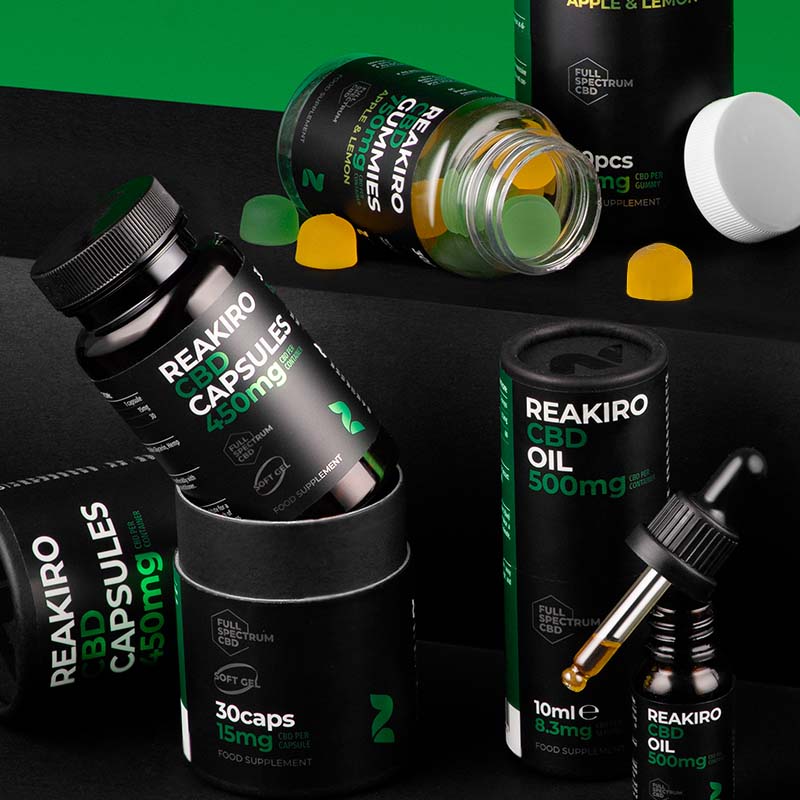Table of Contents
Can CBD Help You Lose Weight?
Picture this: You're going through your weight loss journey, no fun of course! You’re counting burgers, not sheep every night, checking calorie intake, almost living in that gym, yet those stubborn pounds just won't go. Sound familiar?
If you're like many of us navigating the maze of weight loss, you might be wondering: Is there something more I can do? Enter CBD, the plant compound that's been making waves in wellness circles. According to the latest developments CBD has been considered as a possible option for improving weight loss. But amidst the hype, a crucial question remains: Can you use cannabidiol for weight management?
When considering CBD as a potential aid in weight loss it's important to look at well-researched information and separate facts from fiction in the quest for a healthier, happier you. So here's a breakdown of what we'll be covering: effects of CBD on body composition, the impact of CBD on metabolism, CBD and appetite suppression, cannabidiol and fat burning, cannabidiol and energy expenditure and of course we will look into trusted scientific studies on CBD and weight loss.
Introduction to CBD
Before we start exploring CBD for managing body weight let’s go back to the basics.
CBD in other words cannabidiol is one of more than 100 compounds found in cannabis plants. You have probably already heard about THC or tetrahydrocannabinol, it’s the one that gets you "high". CBD, on the other hand, is non-psychoactive, and won’t produce the "high" associated with marijuana. Moreover, CBD by affecting CB1 and CB2 receptors in your body (yes, we all have them) is believed to reduce pain, inflammation and anxiety.
These CBD benefits for a healthy lifestyle are being researched by many scientists. According to a recent WHO (World Health Organisation) report CBD is generally well tolerated with a good safety profile, "In humans, CBD exhibits no effects indicative of any abuse or dependence potential…. To date, there is no evidence of public health-related problems associated with the use of pure CBD."[1]
Understanding the Connection Between Stress, CBD and Weight Loss
It's important to establish that there's no magic solution for weight loss, not even CBD and its impact on food intake. Weight loss requires a combination of strategies like a healthy and balanced diet, exercise, metabolism, and lifestyle choices.
One of the factors that might affect your weight loss is stress. Yes, that’s right, it’s the vicious cycle: stress leads to obesity and vice versa. Stress and obesity are connected through various cognitive, behavioural, and physiological factors. Did you know that stress can interfere with cognitive processes, such as self-regulation, and can lead to overeating of high-calorie, high-fat, and high-sugar foods? That’s the good old stress eating. CBD thought interacting with the brain's serotonin receptors, potentially helps to alleviate stress and anxiety, which could indirectly support weight loss efforts by reducing emotional eating.
The Enhancing Endocannabinoid Control of Stress with Cannabidiol research indicates that CBD has been tested in seven double-blind placebo-controlled clinical trials for stress, with a total of 232 participants, and one partially controlled study with 120 participants. All studies demonstrated that CBD significantly reduced the stress response and related symptoms, such as anxiety, depression, fear, and burnout. [3]
The results of these clinical trials are supported by the common (unregulated) use of CBD by over 10% of the world’s population, of which 1/3–2/3 use it to relieve stress and 90% find it effective.
How can one struggling with stress eating manage this stress? Some strategies might help:
- Mindfulness: Techniques, such as deep breathing exercises, meditation, or yoga are believed to help individuals become more aware of their thoughts and emotions. When you’re more aware you respond to stressors more calmly and deliberately.
- Identifying Triggers: Know yourself, know your enemy. Once you know what triggers your stress eating you can develop alternative coping mechanisms or strategies to address these triggers effectively.
- Coping Mechanisms (Healthy ones!): Find alternative ways to cope with stress that don't involve food. For example exercise, hobbies, spending time in nature, or connecting with friends and loved ones.
- Create a Support System: Friends, family, or even a therapist. These people can be there for you, encourage and provide assistance in navigating this challenging situation.
- Healthy Snack Options: It’s always a good idea to keep healthy snack options readily available to satisfy your cravings. It’s like your first aid kit, but it should be healthy. Nutrient-dense snacks like fruits, veggies, nuts, or yoghurt will help you curb hunger and provide essential nutrients.
- Limit Trigger Foods: leave it in the store, out of sight, out of mind. Why buy food that you can’t eat? If you just cross it out off your list and don’t bring it home, you won’t need to battle yourself to stay away from that pack of crisps you know is in the pantry. Surround yourself with healthy snacks, those are your go-to in times of cravings.
- Practice Self-Compassion: Remember to be kind to yourself and practice self-compassion. Setbacks are a natural part of the process of a challenging weight loss journey. Forgive yourself for slip-ups and focus on making positive changes in the future. Move forward with confidence, you’re crushing it!
- If Needed Seek Professional Help: It doesn’t mean you lost the battle or that you’re not strong enough. There’s absolutely nothing shameful about asking for help, it takes courage. If stress eating significantly impacts your quality of life seek professional help from a therapist, counselor, or registered dietitian. Unlike family or friends, these people are professionals and can provide personalised guidance and support tailored to your individual needs.
Cannabinoids and Metabolic Rate
Before we move on to our next topic about the influence of CBD on lipid metabolism, let's discuss CB1 and CB2 receptors in more depth. These receptors were mentioned earlier and are important to understand in relation to CBD and the endocannabinoid system in weight control.
CB1 and CB2 are the receptors that are activated by the intake of cannabinoids. The CB1 receptor mediates most of the psychoactive effects of cannabinoids and is located mainly in the brain. The CB2 receptor is primarily involved in immunosuppressive and anti-inflammatory actions and is expressed mostly in the peripheral immune system. An interesting fact is that these two cannabinoid receptors, CB1 and CB2, are expressed in mammals, birds, reptiles, and even fish. This is an indication of the potential of CBD as a treatment not only for humans but also for animals.
CB1 signalling serves to maintain energy homeostasis throughout the body. Thus, cannabinoids functionally interact with classical neurotransmitters in neural networks that control energy metabolism and feeding behaviour. Enhancing CB1 signalling can increase appetite and stimulate feeding while blocking CB1 suppresses hunger and induces hypophagia. This fact is supported by the research conducted in 2017 on animals.[4]
It suggests that CBD interacts with CB1 and CB2 receptors in lymphoid tissue and the brain, affecting weight. These receptors are believed to play crucial roles in metabolism and food intake. The CBD oil and weight loss study involved rats that received CBD injections over a two-week period at doses of 1.1 and 2.3 milligrams per pound of body weight. Both doses resulted in significant weight loss, with the higher dose having the most noticeable impact. It is important to note that the CBD was not administered orally but was injected.Those these results are promising, we need to understand that, further human research is required to support these findings.
Another study focused on the role of CBD in reducing obesity states that CBD appears to have an anorexigenic effect more substantial in individuals with a higher BMI. [5]
Cannabinoids are known to have an orexigenic effect mediated by CB1 and CB2 receptors, but unlike Δ9-THC (Tetrahydrocannabinol, psychoactive component) which also increases appetite, CBD seems to have the opposite effect and can actually reduce food intake. The observation is relevant to obesity and based on the evidence presented in this research, it seems like further primary research is needed to better understand how CBD affects appetite and other metabolic changes that could impact body weight. We suggest checking Effects of Cannabidiol on Appetite and Body Weight: A Systematic Review for more details. [5]
Metabolism Boost
Along with regular exercise and other healthy lifestyle habits, incorporating natural ingredients into a balanced diet, can help support metabolic health. However, it's essential to consult with a healthcare professional before making significant changes to your diet or lifestyle. This is especially important if you have underlying health conditions or are taking medications. In this chapter, we'll be exploring some natural ingredients that are known to promote metabolic wellness.
- B vitamins, such as riboflavin (B2) and niacin (B3), are crucial for maintaining energy metabolism and supporting overall metabolic health. They convert food into energy and support cellular function.
- Bitter orange extract contains compounds like synephrine, which may help increase metabolic rate and promote fat breakdown. However, it's important to use bitter orange supplements with caution and under the guidance of a healthcare professional, as they can have stimulant effects and may interact with certain medications.
- Green tea extract is a great source of antioxidants, especially EGCG (epigallocatechin gallate), which has been shown to boost metabolism and promote fat burning. Why not have a cup of green tea in the morning instead of your regular coffee?
- Cayenne pepper. Who would think that cayenne pepper is worth considering? As it turns out pepper contains capsaicin, a compound that gives it its spicy flavour. Research has shown that capsaicin can increase metabolism and promote fat oxidation.
- Cinnamon has also been studied for its potential to improve insulin sensitivity, regulate blood sugar levels, and support metabolic health. Adding cinnamon to your foods or beverages may help enhance your metabolism and contribute to your overall wellness.
If you're not quite ready to delve into the complexities of these ingredients, you might want to consider Metabolism Boost CBD Capsules. These capsules are packed with essential nutrients like biotin, riboflavin, pantothenic acid, niacin, and premium CBD extract, which can help with macronutrient metabolism, leading to better weight management.
Conclusion
At Reakiro, we are excited to stay up-to-date with the latest developments and research in the field of weight management, particularly in relation to CBD. We understand that achieving and maintaining a healthy weight requires a multifaceted approach that includes lifestyle choices, exercise, stress management, and overall well-being, rather than just dieting. Although CBD is a potential supplement to a healthy lifestyle, it’s a not standalone solution and achieving sustainable weight management requires a comprehensive approach.
Sources:
- Cannabidiol (CBD)
- Cannabinoid Receptor Signaling in Central Regulation of Feeding Behavior: A Mini-Review
- Enhancing Endocannabinoid Control of Stress with Cannabidiol
- Cannabinoid Receptor Signaling in Central Regulation of Feeding Behavior: A Mini-Review
- Effects of Cannabidiol on Appetite and Body Weight: A Systematic Review



